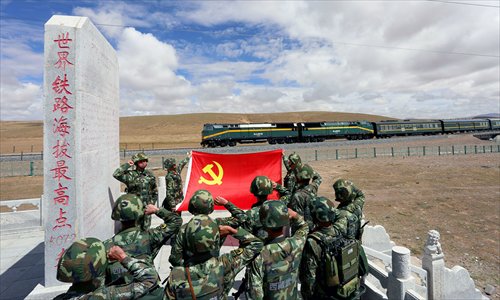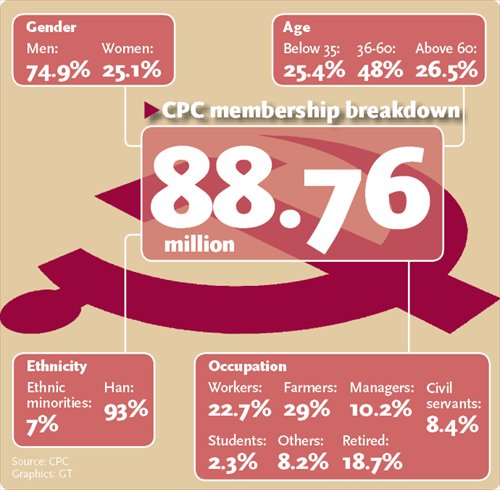CPC expands China’s diplomacy
Enhancing ties with global parties helps correct misconceptions: experts

Soldiers renew their vows in front of the flag of the Communist Party of China at a monument marking the peak altitude railway in Nagqu, Tibet Autonomous Region on Thursday. The Party celebrates its 95th anniversary on July 1. Photo: Xinhua

Graphics: GT
The Communist Party of China (CPC) has been working to expand its relations with political parties in other countries in recent years, a move that experts said greatly complements state-to-state diplomacy in reducing tensions, and can also help correct misconceptions of China's ruling party which turns 95 years old on Friday.
"The CPC has engaged in various exchanges and cooperation with over 600 parties and political organizations from more than 160 countries … more people are beginning to understand our values, and support the path the Chinese people have chosen," Song Tao, head of the International Department of the CPC Central Committee (IDCPC), was quoted as saying in a China Central Television documentary to mark the CPC's 95th anniversary.
The CPC announced on Thursday that it had 88.76 million members by the end of 2015, 1.1 percent more than the previous year.
The CPC department tasked to handle international exchanges provides daily updates on its official website of visits made by senior CPC leaders to other countries, as well as the visits of foreign party delegations to China.
The latest exchange was the visit of Cuban leader Raul Castro's special envoy Salvador Valdes Mesa to the IDCPC on Tuesday.
Xu Xing, a professor of politics at the Zhou Enlai School of Government at Nankai University, told the Global Times that inter-party exchanges not only smoothen diplomatic relations but also allow the outside world to better understand China's political system.
Xu said that the CPC has a tradition of seeking friendly relations with other communist parties, especially the Vietnam and Cuba communist parties, since they share similar socialist values.
The IDCPC also handles most of China's official exchanges with North Korea. On May 31, as international tensions rose over North Korea's rocket launches and nuclear program, Song met with senior North Korean official Ri Suyong and a Workers' Party of Korea delegation in Beijing to discuss the two sides' ideas on "major issues."
Benefits of exchanges
"The CPC has now expanded exchanges with different parties to serve China's foreign policy. For example, frequent exchanges with minority parties in Japan in the 1950s contributed to the establishment of diplomatic relations between China and Japan," Wang Zhanyang, a professor at the Central Institute of Socialism, told the Global Times.
China established a communication mechanism with Japan's ruling party in March 2004.
Although exchanges between the two governments in recent years reached an impasse due to historical and territorial disputes, the communications between the CPC and the Japanese Liberal Democratic Party and the Komeito Party have not stopped. In December 2015, exchanges between China and Japan's ruling parties resumed after six years.
Since 1978, the CPC has held exchanges with parties in Asia, Africa and Latin America, as well as in Europe and the US.
China and the US resumed diplomatic ties in 1979, but their inter-party relations were not in place until 2010, when the first high-level dialogue between the CPC and the US Democratic Party and Republican Party were held in Beijing.
Learning from China
"The politicians also want to learn from the CPC's experiences since it has lasted 95 years and has led 1.3 billion Chinese to economic and social development," said Xie Chuntao, a professor with the Party School of the CPC Central Committee.
As the scope of the CPC's international exchanges expands, the content and form continue to diversify, including dialogues, leadership training, personnel exchanges and economic cooperation.
Su Wei, a professor at the Party School of the Chongqing Committee, told the Global Times that China and the CPC's influence have increased in the international community especially since the anti-corruption campaign starting in 2012. "Some politicians and scholars have shown an interest in studying the China Model and CPC self-discipline," he said.
Nguyen Vinh Quang, a former envoy at the Vietnamese Embassy in China, told the Xinhua News Agency on Wednesday that the CPC's theoretical system underpins China's development and also provided lessons for Vietnam.